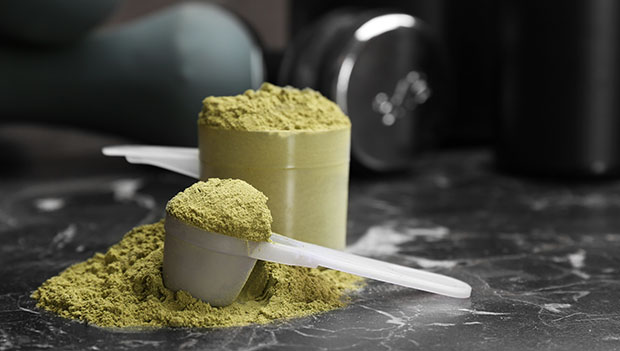
With benefits like reduced overall body weight and decreased body fat, it's no wonder that high-protein diets are wildly popular.(1) If you want to eat more protein but are unsure which to choose, hang tight because we will discuss whey protein versus plant protein in depth.
Both plant-based protein and whey protein offer benefits. As with most things, it is not a one-size-fits-all situation. Learn about the uniqueness of each option to determine which will be a good fit for you. We will share some of our favorites so you can decide which is best for you—you might even find that a mixture of both works well in your life! Let's dig into this showdown of whey versus plant protein.
Why Trust Us?
The health and safety of ACTIVE's readers is of the utmost importance to us. To ensure your well-being when consuming dietary supplements, the ACTIVE.com editorial team prioritizes products that are independently tested by a third party. We've also consulted with a team of nutritionists and dieticians to ensure the products we feature are of the highest standard. This helps us create the most accurate, authentic review content for our readers.
Disclaimer: Exercise caution when taking supplements. Always make sure to consult with your doctor before trying a new supplement or pill. Weight-loss supplements are not a substitute for a balanced diet and regular exercise. Any supplements taken should be used in accordance with a healthy lifestyle. Any weight loss of more than a pound per week over a long period of time is unusual and should be monitored by a doctor.
Whey Protein vs. Plant Protein
By clicking on the product links in this article, we may receive a commission fee at no cost to you, the reader. Sponsorships and affiliate commissions help support our research so we can help you find the best products. Read the full affiliate disclosure here.
Whey Protein
What Is Whey Protein?
Whey protein is one of the main proteins in milk. During the cheesemaking process, the liquid is separated from the curds. This liquid whey is later dried and will become the popular protein supplement that we all know. It is also used to increase the creaminess or thickness of certain manufactured foods. Whey protein supplements often come in bars, sports beverages, or protein powders.
Whey protein powder is highly absorbable, high-quality protein that has been proven to support muscle growth as well as recovery. It's most commonly sold in the following forms:
- Whey protein concentrate: The most basic and common form of whey protein sold.
- Whey protein isolate: Microfiltered whey protein concentrate in which lactose, fats, and cholesterol are removed.
- Hydrolyzed whey protein: Whey protein isolate that has been further broken down to a "predigested" state
Despite their differences, the overall benefits from each only vary slightly, if at all. Whey protein is a high-quality protein that the body can absorb easily. Whether used after a workout or to boost your daily protein intake, it's a tried and true option.
Our Favorite Whey Proteins
Plant Protein
What Is Plant Protein?
Plant protein is derived from, you guessed it, plant sources. It may seem obvious, but plant protein excludes any animal protein, even that of milk, such as whey or casein.
Common forms of plant protein include:
- Pea
- Soy
- Wheat
- Rice
- Lentil
- Hemp
Protein is extracted from various plants by either chemical, ultrafiltration, or enzymatic extraction. Regardless of the method, protein is isolated from the plant of choice. Enzymatic extraction seems to be the "cleanest" method of isolating the protein because there is no need for added chemicals. It is then mixed with other ingredients to create flavored powders and baked goods.
Plant protein has been shown to provide health and physical benefits and is more sustainable than animal protein.(2) It is often easily digestible and not very likely to cause stomach upset for most people.
Our Favorite Plant Proteins
Differences Between Whey and Plant Proteins
There are plenty of differences between whey protein and plant protein. For starters, the ability of whey protein to be absorbed and used by the body, also known as bioavailability, is very high regardless of the form it comes in.(3) However, the bioavailability of plant protein varies from plant to plant.
In 2013, the Food and Agriculture Organization (FAO) of the United Nations released a protein quality comparison.(4) This comparison reviewed many popular plant-based proteins and the two milk proteins, whey and casein. They found that whey protein had the highest biological value, also called bioavailability, followed by hemp, casein, soy, pea, and rice. It's clear that whey leads the race for being the most easily digested and absorbed protein.
Additionally, the amino acid makeup of plant proteins varies, and they don't always contain all nine essential amino acids, whereas whey protein is considered a complete protein containing all amino acids. However, whey protein often contains lactose, which is difficult to digest for a large portion of the population. It is also not suitable for vegans and those with dairy allergies. Plant protein may be easier on the stomach for some and is a preferred protein for vegans.
Similarities Between Whey and Plant Proteins
Believe it or not, when comparing plant-based protein versus whey, they actually have quite a bit in common. In fact, depending on the protein itself, certain plant-based proteins have shown similar benefits.(5) Studies have found the protein digestibility between whey and other proteins like pea, soy, and quinoa to be very close in nature.(6)
Contrary to popular belief, whey protein does not have a specific unique quality when it comes to increasing muscle growth compared to plant proteins.(7) High-quality plant proteins can have very similar effects. It is important to note that plant proteins vary in quality based on the plant they come from, and thus not all are high quality.
Which Is Better for Muscle Growth: Whey Protein or Plant Protein?
We all associate protein with muscles, as we should. Protein is made up of amino acids, which are the building block of muscles. There are more similarities than differences when comparing whey protein versus plant protein. However, a meta-analysis of 16 related studies found that whey proteins had a slightly more beneficial effect on muscle size when compared to plant protein. It's important to remember that size does not equal strength.(8)
You may be surprised to learn that the same study found that despite whey protein's effect on muscle size, its effect on strength was very similar to that of plant protein. A recent study found that pea protein had similar effects on strength, performance, and body composition.(9) So, depending on the plant protein, the results might be comparable to whey.
Which Is Better for Weight Loss: Whey Protein or Plant Protein?
Although the research on plant-based proteins and weight loss is somewhat scarce, we know that plant-based diets are linked to lower weights.(10) We also know that people who weigh less often consume more plant proteins and fewer animal proteins in comparison to those who way more.(6)
However, time and time again, it's been shown that those who consume whey protein are more likely to experience weight loss or a decrease in fat mass than those who don't consume additional protein.(11) When it comes to whey protein versus plant protein and weight loss, the jury may still be out as to which is best. However, we know that diets high in protein are linked to lower weights. Therefore, it may be a good idea to focus on consuming enough protein throughout the day to meet your needs.(1)
FAQs About Whey vs. Plant Protein
Is plant-based protein better?
In short, a plant-based protein is not necessarily better. It depends on what you're looking for. If you have digestive issues, experience bloating and stomach discomfort with whey protein, refrain from dairy products, or are more concerned with sustainability, plant-based protein would be more suitable for your lifestyle. However, if that's not the case, whey protein provides plenty of benefits, as well.
Is whey or plant protein better for bodybuilding?
It depends on your specific needs. When consuming protein for muscle growth, first be sure you're taking in enough calories and protein to meet your needs. If choosing a plant protein, be sure to pick a high-quality protein to maximize your results.
Is whey or plant protein absorbed faster?
Generally speaking, whey protein is absorbed faster based on the FAO's protein quality comparison.
These statements have not been evaluated by the Food and Drug Administration. This product is not intended to diagnose, treat, cure, or prevent any disease.
References
- Moon J, Koh G. Clinical Evidence and Mechanisms of High-Protein Diet-Induced Weight Loss. J Obes Metab Syndr. 2020 Sep 30;29(3):166-173. doi: 10.7570/jomes20028. PMID: 32699189; PMCID: PMC7539343.
- 2. Hertzler SR, Lieblein-Boff JC, Weiler M, Allgeier C. Plant Proteins: Assessing Their Nutritional Quality and Effects on Health and Physical Function. Nutrients. 2020 Nov 30;12(12):3704. doi: 10.3390/nu12123704. PMID: 33266120; PMCID: PMC7760812.
- Gaudichon, C., & Calvez, J. (2021). Determinants of amino acid bioavailability from ingested protein in relation to gut health. Current Opinion in Clinical Nutrition and Metabolic Care, 24(1), 55-61. https://doi.org/10.1097/MCO.0000000000000708
- Leser, S. (2013). The 2013 FAO report on Dietary Protein Quality Evaluation in human nutrition: Recommendations and implications. Nutrition Bulletin, 38(4), 421–428. https://doi.org/10.1111/nbu.12063
- Hoffman, J. R., & Falvo, M. J. (2004). Protein – Which is Best? Journal of Sports Science & Medicine, 3(3), 118-130. https://doi.org/https://www.ncbi.nlm.nih.gov/pmc/articles/PMC3905294/
- Hertzler, S. R., Lieblein-Boff, J. C., Weiler, M., & Allgeier, C. (2020). Plant Proteins: Assessing Their Nutritional Quality and Effects on Health and Physical Function. Nutrients, 12(12). https://doi.org/10.3390/nu12123704
- Teixeira, F. J., Matias, C. N., Faleiro, J., Giro, R., Pires, J., Figueiredo, H., Carvalhinho, R., Monteiro, C. P., Reis, J. F., Valamatos, M. J., Teixeira, V. H., & Schoenfeld, B. J. (2021). A Novel Plant-Based Protein Has Similar Effects Compared to Whey Protein on Body Composition, Strength, Power, and Aerobic Performance in Professional and Semi-Professional Futsal Players. Frontiers in Nutrition, 9. https://doi.org/10.3389/fnut.2022.934438
- Lim, M. T., Pan, B. J., Kiat Toh, D. W., Sutanto, C. N., & Kim, J. E. (2021). Animal Protein versus Plant Protein in Supporting Lean Mass and Muscle Strength: A Systematic Review and Meta-Analysis of Randomized Controlled Trials. Nutrients, 13(2). https://doi.org/10.3390/nu13020661
- Banaszek, A., Townsend, J. R., Bender, D., Vantrease, W. C., Marshall, A. C., & Johnson, K. D. (2019). The Effects of Whey vs. Pea Protein on Physical Adaptations Following 8-Weeks of High-Intensity Functional Training (HIFT): A Pilot Study. Sports, 7(1). https://doi.org/10.3390/sports7010012
- Ivanova, S., Delattre, C., Karcheva-Bahchevanska, D., Benbasat, N., Nalbantova, V., & Ivanov, K. (2021). Plant-Based Diet as a Strategy for Weight Control. Foods, 10(12). https://doi.org/10.3390/foods10123052
- Frestedt, J. L., Zenk, J. L., Kuskowski, M. A., Ward, L. S., & Bastian, E. D. (2007). A whey-protein supplement increases fat loss and spares lean muscle in obese subjects: a randomized human clinical study. Nutrition & Metabolism, 5, 8. https://doi.org/10.1186/1743-7075-5-8
About the Author

Byree is a registered dietitian with a Master of Science in Dietetics and Nutrition. Bryee is fascinated by food science and biochemistry but also enjoys simple recipe creations as she loves breaking down evidence-based info into digestible guides.







Discuss This Article